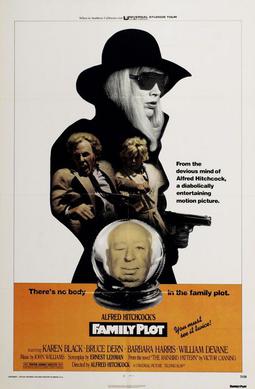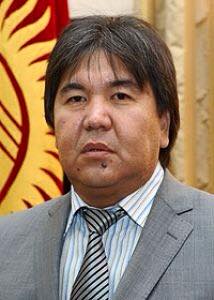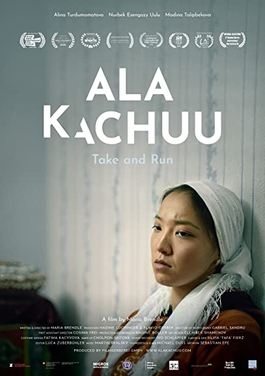
Seven Brides for Seven Brothers is a 1954 American musical film, directed by Stanley Donen, with music by Gene de Paul, lyrics by Johnny Mercer, and choreography by Michael Kidd. The screenplay, by Albert Hackett, Frances Goodrich, and Dorothy Kingsley, is based on the short story "The Sobbin' Women", by Stephen Vincent Benét, which was based in turn on the ancient Roman legend of the Rape of the Sabine Women. Seven Brides for Seven Brothers, which is set in Oregon in 1850, is particularly known for Kidd's unusual choreography, which makes dance numbers out of such mundane frontier pursuits as chopping wood and raising a barn. Film critic Stephanie Zacharek has called the barn-raising sequence in Seven Brides "one of the most rousing dance numbers ever put on screen." The film was photographed in Ansco Color in the CinemaScope format.

Elopement is a marriage which is conducted in a sudden and secretive fashion, sometimes involving a hurried flight away from one's place of residence together with one's beloved with the intention of getting married without parental approval. An elopement is contrasted with an abduction, in which either the bride or groom has not consented, or a shotgun wedding in which the parents of one coerce both into marriage.

Family Plot is a 1976 American black comedy thriller film directed by Alfred Hitchcock in his final directing role. It was based on Victor Canning's 1972 novel The Rainbird Pattern, which Ernest Lehman adapted for the screen. The film stars Karen Black, Bruce Dern, Barbara Harris and William Devane; it was screened at the 1976 Cannes Film Festival, but was not entered into the main competition.

Bride kidnapping, also known as marriage by abduction or marriage by capture, is a practice in which a man abducts the woman he wishes to marry.

The culture of Kyrgyzstan has a wide mix of ethnic groups and cultures, with the Kyrgyz being the majority group. It is generally considered that there are 40 Kyrgyz clans, symbolized by the 40-rayed yellow sun in the center of the flag. The red lines inside the sun visualise the crown of a yurt, the traditional dwelling of nomadic farmers, once the main population of the Central Asian area. The dominant religion of Kyrgyzstan is Sunni Islam (91%). The Russian population is Russian Orthodox.

Human rights in Kyrgyzstan improved after the ouster of President Askar Akayev in the 2005 Tulip Revolution and the installment of a more democratic government under Roza Otunbayeva. While the country is performing well compared to other states in Central Asia, many human rights violations still take place. While LGBT rights have been declining in recent years, freedom of press has been improving.

Kurmanjan Datka or Datka Kurmanjan Mamatbay kyzy, also known as "The Tsaritsa of Alai" or "The Queen of the South", was a politician in Kyrgyzstan who acquiesced under duress to the annexation of that region to Russia. She was a female tribal leader and nicknamed queen.

Aktan Arym Kubat, also known as Aktan Abdykalykov, is a Kyrgyzstani director, screenwriter and actor. Member of the National Film Academy of the Kyrgyzstan, acting Member of the European Film Academy, acting Member of Asia Pacific Screen Academy.

Ala kachuu is a form of bride kidnapping still practiced in Kyrgyzstan. The term can apply to a variety of actions, ranging from a consensual elopement to a non-consensual kidnapping, and to what extent it actually happens is controversial. Some sources suggest that currently at least a third of Kyrgyzstan's brides are taken against their will.
Beshkempir is a 1998 Kyrgyz language film. Shot and produced in Kyrgyzstan, it is representative of the first wave of independently produced cinema in the country after its independence from Soviet Union. It was directed by Aktan Abdykalykov, and stars the director's son Mirlan Abdykalykov in the lead role. This simple bildungsroman went on to receive critical acclaim, and won numerous international awards including the Silver Leopard Prize at the 1998 Locarno International Film Festival. The film was selected as the Kyrgyz entry for the Best Foreign Language Film at the 71st Academy Awards, but was not accepted as a nominee.

Paruthiveeran is a 2007 Indian Tamil-language romantic drama film written and directed by Ameer. The film stars Karthi in his feature film debut as the title character, with Priyamani as the female lead and Ponvannan, Saravanan, Ganja Karuppu, Sampath Raj, and Sujatha Sivakumar playing supporting roles. Produced by Studio Green, it features a soundtrack and score composed by Yuvan Shankar Raja, cinematography by Ramji and editing by Raja Mohammad. The film was remade into Bengali Bangladesh as PoraMon 2 (2018).

Women in Kyrgyzstan traditionally had assigned roles, although only the religious elite sequestered women as was done in other Muslim societies. Rural inhabitants continue the traditional Siberian tribal practice of bride kidnapping. Bride kidnapping, known as ala kachuu, girls as young as 12 years old are kidnapped for forced marriage, by being captured and carried away by groups of men or even relatives who, through violence or deception, take the girl to the abductor's family who forces and coerces the young woman to accept the illegal marriage. In most cases, the young woman is raped immediately in the name of marriage.[8]
Forced pregnancy is the practice of forcing a woman or girl to become pregnant or remain pregnant against her will, often as part of a forced marriage, as part of a programme of breeding slaves, or as part of a programme of genocide. Forced pregnancy is a form of reproductive coercion.

Sadyk Sher-Niyaz is a director, producer, and public figure from the Kyrgyz Republic, best known for his work on the film Kurmanjan Datka: Queen of the Mountains
Ak Ilbirs, National Film Awards in the Kyrgyz Republic, was established to recognize the best achievements in the cinema in the country and to stimulate the artistic growth of national cinema in all areas of filmmaking.
Aida Kasymalieva is a Kyrgyz journalist and politician who has been deputy speaker of the Supreme Council since December 2018. She has been an advocate for women's rights in the context of domestic violence, bride kidnapping and child marriages within her country.

The Third Wife is a 2018 Vietnamese costume drama film written and directed by Ash Mayfair, in her feature debut. Set in the 19th century, it follows a 14-year-old girl who becomes the third wife to a landowner in rural northern Vietnam.

Sex trafficking in Kyrgyzstan is human trafficking for the purpose of sexual exploitation and slavery that occurs in the Kyrgyz Republic.

Ala Kachuu – Take and Run is a 2020 Swiss short film directed by Maria Brendle and produced by Nadine Lüchinger and Flavio Gerber, Filmgerberei. The film is about a Kyrgyz girl who falls victim to bride kidnapping.














